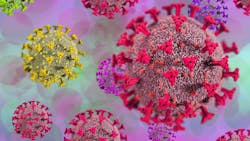Odds of testing positive for SARS-CoV-2 following receipt of 3 vs 2 doses of the mRNA vaccine
A large study of booster efficacy was conducted by researchers at the Maccabi Healthcare Services in Israel. They found that a third dose of the mRNA vaccine BNT162b2 provided additional protection against detected SARS-CoV-2 infection.
Across the test-negative and matched case-control analyses, they estimated an 83% to 87% reduction in the odds of testing positive for SARS-CoV-2 after at least 2 weeks following receipt of the booster compared with receiving 2 doses. These numbers should be interpreted as the reduction in the odds of infection in a person receiving the booster dose compared with a person receiving only the 2 primary doses. This reduction comes on top of the reduction in the risk conferred by the first 2 doses.
This analysis also suggests that individuals who received the booster dose have a lower odds of hospitalization than those receiving 2 doses. However, these results should be interpreted with caution because a reduction in the odds of hospitalization was already evident in the first week after receipt of the booster when an effect would not be expected.
This association with reduction in the first week could occur if individuals who are already infected and symptomatic with COVID-19 are less likely to seek a booster dose. This bias would make it appear that those with a booster dose are less likely to be hospitalized and would explain why the estimated effect was strongest at 0 to 6 days post booster.
The study population included 306,710 members of Maccabi Healthcare Services who were 40 years and older (55% female) and received either 2 or 3 doses of the BNT162b2 vaccine and did not have a positive PCR test result for SARS-CoV-2 prior to the start of the follow-up period.
